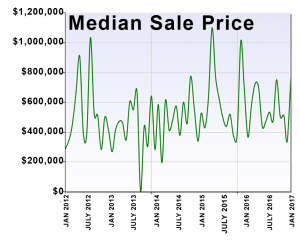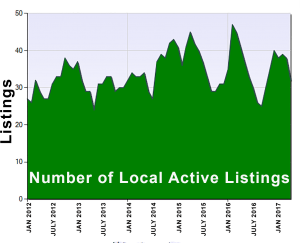Spring 2017 Newsletter
- BUYER GUIDELINES AND TIPS
- LEGISLATIVE NEWS
- FINANCING TIPS
BUYER GUIDELINES AND TIPS

In the National Association of Realtors 2016 Profile of Homebuyers and Sellers, it was reported 90 percent of buyer and sellers used an agent during the real estate process. This was not only to negotiate a deal or handle the mountain of paperwork and disclosure issues in a given transaction. Given the present day preponderance of on-line data, the plethora of misleading valuations and false realities, and the well-meaning advice of family and friends, an overwhelming number of buyers eventually sought the help of a Realtor. They looked to a professional real estate counselor as someone they ultimately trusted to help them identify and purchase the most suitable location, properly priced, also affordable, property for their individual needs and wants, and to guide them to the appropriate financing sources.
Buyers need to come to the table with a firm understanding of what kind of home they need and what they can afford to pay for it. They should narrow their search to neighborhood(s) that suit their work, play, school, lifestyle; they should have an idea of their plans for that home in say, five years.
It’s interesting to note during 2016, for the third year in a row, the average age of a typical homebuyer was 44 years old. The largest number of buyers were married, but the percentage of single female observed opportunity for single women is making home-buying more feasible for them.
Inventory is now at a 20 year historic low. Credit, although easing a bit over recent years, remains tight. Documentation requirements are quite detailed. Sellers are understandably leery of buyers who have not aligned with a mortgage professional, let alone who have not even started the process with a lender, before viewing their home. When you find the right home, do everything possible to be, and be viewed in, the best position you can to buy that home, or you could lose it..
Be Prepared!
To Inman News (www.Inman.com/2016/11/02/poll), there are three major mistakes made by first–time homebuyers…and they are worth calling to mind for even the seasoned buyer, especially the one who is in a relocation situation, simultaneously selling and buying, with tight moving deadlines:
-
- Not talking to a lender first… ‘Pre-qualified” means a lender has taken a simple glance at your credit score and you’ve had a quick conversation about income. Get a “pre-approval” which means you have provided that lender with the required income documentation . Get your paperwork in order, including 3 months asset account statements, two years IRS Returns, paystubs, paper trail of down payment. A seller will consider your offer stronger if you are pre-approved, and if you’re competing with a cash buyer, this may be the only foot you have in the door.
- Waiting too long to make an offer…do your homework, vet your real estate agent so you feel confident in his or her guidance, narrow your wish list, and search only the most plausible areas and price range for the features you want. Do your part, i.e. communicate with your agent, and be ready to step up when you find the right property.
- Offering too little for properties… Making a strong offer doesn’t necessarily mean making a full price offer. Sometimes sellers are working in a tight transfer situation, sometimes their property, for whatever reason, has lingered on the market longer than others in the same area. A Realtor can help you determine if these are meaningful considerations when making your offer, and also help you evaluate that market and prevailing conditions and pricing so you feel confident you are not over-paying.
Ten times out of ten, rather than making a low ball offer to that seller, which can immediately move him into an antagonistic position, it’s better to make an offer that at least seems fair or well-thought-out. There are times, even where he may not have considered it acceptable under different circumstances, a seller may be inclined to accept rather than counter… given your quick action, your financial qualification, the proposed length of escrow, the number of contingencies you put in the contract. There are situations where price is not the only seller motivation, terms might play a major role, and your own qualification, sincerity and stability weigh in.. In any event, listen to your agent, and when you decide to make your move, give thought to the structure of your offer and keep it reasonable.
LEGISLATIVE NEWS
April 28, 2017, Tallahassee, Fl. HB-483/SB 398 has passed, thanks to a multi-year effort by Florida Realtors to reign in the astronomical fees some association management companies have been charging sellers for estoppel certificates when they go to sell their units.
A title company closing a condominium sale will require an estoppel certificate be ordered and paid for by the seller, it is an affidavit from the HOA management company that seller is up to date with homeowner association dues and any other pending assessments as of the date of closing and transfer to a new owner. Whereas a management company should by definition of duty have this information at their fingertips, there has been no control on what is considered a fair charge for a relative courtesy, putting this information in writing, in the form of a letter of affidavit, to the title company on the seller’s behalf.
Up to now there has been no cap, no legislation stating what is considered a “reasonable fee” to charge a seller for this letter.. Across our State, there have been estoppel fees reported as high as $1610, charged to the seller of a property that sold for only $190,000!
Once signed into law, the statutory cap will go a long way to curb exorbitant fees charged many owners of condos / deed restricted communities by association management companies. The cap is now proposed to be $250 per unit for owners who are current in their assessments. An additional $100 can be charged for “expedited” estoppel certificates (delivered within 3 business days), and another $150 can be charged if that owner is delinquent in assessments. Thus the maximum will be $500 for a single delinquent expedited estoppel certificate. There will be a standard estoppel form used across our State, and it will be valid for 30 days.
Thank you Florida Realtors!
FINANCING TIPS
The Home (Mortgage) Run…
When buying a home, or refinancing your present mortgage, it’s wise to consult a mortgage specialist to match your individual needs and goals with the right mortgage, in this case a Fixed Rate Mortgage amortized over 15 years versus 30 years. If you borrow $100,000 for 15 years at an available rate of 3.65% you’ll end up paying $130,008.60 in principal and interest. Borrow for 30 years at a rate of 4.02% annual interest rate, you’ll pay $172,284.85. Thus you’ll save $42,276.25 if you can afford the 15-year loan with a monthly payment of $722.27 versus $478.57 per month for a 30-year program. The $243.70 extra per month adds up to $43,866 over the 15-year term of the loan.
However, consider this: each year that a mortgage amortizes, a smaller portion goes to pay interest…which is tax deductible … while a larger portion repays principal. As you continue to lose deductions you must earn more pretax dollars to make the monthly payments. Consult your tax advisor. Depending on your tax bracket, you may need to earn more than a dollar pretax, say $1.43 per dollar at a 30% tax bracket, to pay each nondeductible dollar.
After accounting for lost interest deductions, let’s look again at this scenario. You would need $154,750 in pretax income to pay off the 15 year loan. But with more dollars going to interest, you would need to earn just $146,442 to make 15 years of payments ($8,6142) on the 30-year loan. The difference, $8,308 is the cost of making extra payments totaling $43,866 on the 15 year loan .
Although you still owe $86,142.43 on the 30 year mortgage after 15 years, the lower payment lets you save $243.70 per month. If you have the discipline to invest these monthly savings, say in stocks or mutual funds, and the portfolio returns 10% after tax over 15 years, it could grow to enough to pay off your mortgage with a few dollars left over. ……All food for thought perhaps, in a perfect world. Consult your personal financial advisor.
Here’s an example of one solid strategy if you select a 30 years program…make one extra payment each year on the anniversary of your loan, you will pay off your 30 year mortgage two years four months early, saving $8,322.24.
The bottom-line advantage of a 30 year mortgage is flexibility.
RECENT MARKET STATISTICS
Pinellas County…
David Bennett, CEO of the Pinellas Realtor Organization, reports some powerful numbers ending the first quarter of 2017 in our County. Dollar Volume for Townhomes/Condos was $199.3 million in March 2017, an increase of 35.6% from $147.0 million in March 2016. Dollar Volume for Single Family Homes increased 21.5% year-over year, with $408.9 million in 2017 versus $336.6 million in March 2016. Median time for contract and sale has reportedly decreased across the board. The Median Sale Price for Single Family Homes was up 15.0% from last year, at $230,000 for March 2017 versus $200,000 for March 2016. Average Sale Price for Single Family Homes grew 16.0%, at $299,356 in March 2017 versus $258,152 in March 2016. The Median Sale Price for Townhomes/Condos was $139,000 for March 2017, up 4.5% from $133,000 in March 2016. Year-over-year, Closed Sales for the Single Family segment were up 4.8%, and Closed Sales for the Townhome/Condo segment grew an impressive 26.3%.
New Listings for Single Family for March were 1,607, up 4.8% from last March, at 1,533. New Listings for Townhome/Condo for March 2017 were at 1,063, up 5.6% from 1,007 in March 2016. The strong seller’s market grew even stronger in March, with Months Supply of Inventory down 6.9% year over-year for Single Family Homes, with a 2.7 Month Supply this March, as compared to a 2.9 Month Supply in March 2016. Months Supply of Inventory for Townhome/Condo fell an astounding 15.0%, with 3.4 months in March 2017 and 4.0 months in March 2016.
Representing more than 8,000 members, the Pinellas Realtor® Organization is one of the Tampa Bay area’s largest professional trade associations. The organization advances and promotes the real estate profession through professional development programs, government affairs, and political advocacy and maintains a high standard of conduct by real estate professionals through professional standards training and administration.
Two Historic Market Graphs, Pass-a-Grille Area. ( including Don Cesar, Pass-a-Grille and Vina del Mar)


